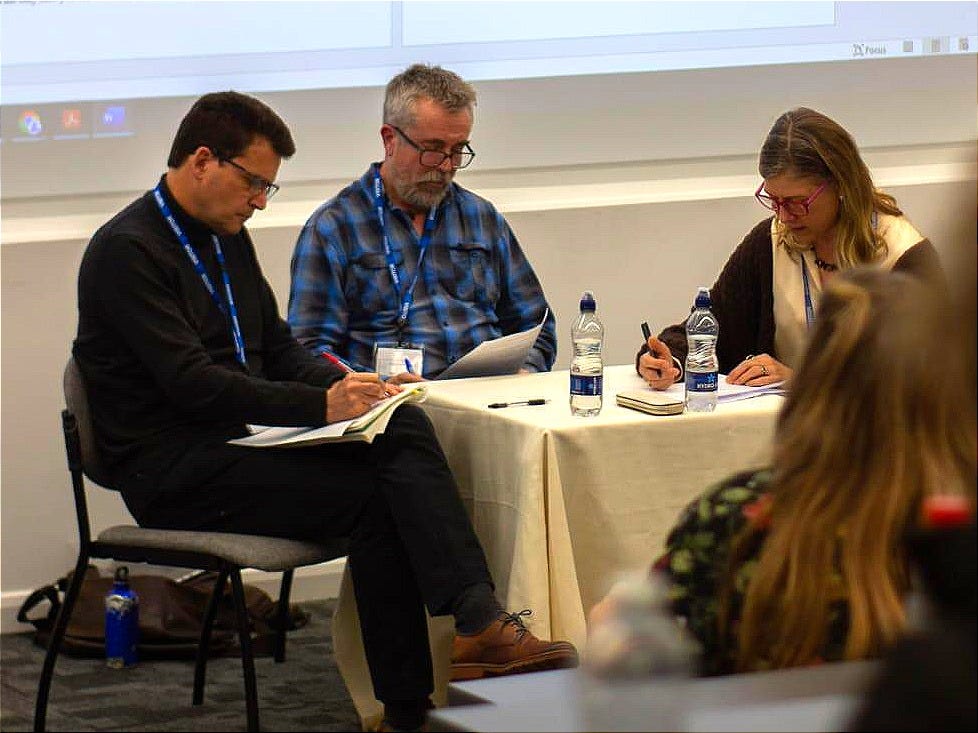An Educational Experience / 'A Failed Delivery' (short story)
You might sometimes blame the messenger, but never (ever) admonish the reader.
Earlier this week I was a guest at a writers’ festival for English A-Level students attending a local sixth form college (= ‘high school’ for US readers). With two fellow ‘Hyde Writers’, we demonstrated in ‘real-time’ what a writers’ group actually does when critiquing drafts, using our own work-in-progress as examples. Usually, our group meets up monthly in a favoured pub, with 4 to 10 writers attending. However, just the three of us managed to cope with ~100 students listening in to our typical round-robin process in a large lecture theatre, with only the pint glasses absent (school rules, eh?) during our allotted hour.
The younger audience was attentive, their questions were intelligent and the reaction was positive, with several students afterwards wanting to set up their own groups or discover where they might meet other writers.
It was also great for the students to witness the additional benefits of fun and friendship when writers finesse their work using considerate and thoughtful feedback. I thoroughly enjoyed myself, despite taking steps to allay my nervousness in the preceding days.
I normally bring a draft chapter (currently from my second novel) to the group for critique. But the piece I showcased at this event was a brand new short story. As I told the audience, this was writing which had never been read or listened to before except by myself. I like to think an expectant hush fell over the room at that point. Pile on the pressure, why not…
After the event I returned home in a state of happiness, having thoroughly enjoyed the session, and promptly analysed my fellow writers’ scribbled feedback, to adopt, adapt or ignore their points, as appropriate. This final version of the story is now available below for you to ingest.*
I hope you enjoy the piece as much as the student who came up to me afterwards and asked, “I really like your writing. Is there a group near to me I can join?” There can be no better response when attempting to educate and inspire the next generation of writers.
Until next time…
* Bonus marks for spotting a playful Margaret Atwood reference within my speculative piece.
A Failed Delivery
Adam weaves expertly through spaces between the oncoming commuters, navigating the human current fed by the city’s emptying offices. Most are heading for the station he’s emerged from. The train had been late, causing him to be. He hugs a manila envelope to his chest as his other hand cleaves fresh spaces for his hurried passage. The postbox is a quarter of a mile away and only a few minutes remain. His instructions are to post the envelope at precisely five o’clock, or it will never reach its intended destination.
He ignores the mutters of those filling the spaces in his wake and cranes his neck to peer over heads and hats. The postbox isn’t visible yet. He’s not used it before, unaware of its existence until yesterday’s unscheduled meeting. The young woman who’d entered his first-floor office had been very specific, very intense and very striking. Her foreign hair and accent, and a tangible air of the future, had only deepened his interest. Her sky-blue eyes had scanned his face intently as she’d leant over his desk to place a large, blank envelope before him. This Messenger – for that was the only possibility – had then given her instructions to him, her chosen Courier, in a curt and professional manner.
He’d already known her answers to the questions he’d then asked. Both had to adhere to Message Protocol to prevent their transaction being negated, with all memories wiped. No, he wasn’t recording her instructions. Yes, standard procedures would apply. But Protocol didn’t prevent his asking one more: No, he couldn’t know her name. Spoken in the same procedural monotone, only a lift of an eyebrow and a twitch of her lips had given him reason to hope.
Timing and tradition had required a small but essential adjustment to this world to sanction her request. She’d extended her left hand from an exquisitely embroidered sleeve of black silk. Nestled in her palm, the timepiece was a circular slice of transparent crystal, suffused with glittering, multi-hued potential. Her gaze had never wavered as Adam had revealed a silver fob watch in his own left palm, its century-old engraving a deception for every present; prior, future and current.
Without a word, their empty right palms had simultaneously skimmed over the other’s time-clasped lefts. He still remembered her smooth skin, as white and cool as polished marble. The brief bliss of their Synchrony had shuddered down Adam’s spine; pain and pleasure in equal measure. His visitor had failed to mask her own sensing of it: eyelids closing as her lips squeezed together; an almost imperceptible lift of her chin as she’d inhaled deeply through flared nostrils. Bliss indeed.
She’d departed as quickly as she’d arrived, hair bobbing in time with each well-heeled step. Adam had let his body droop until his forehead had touched the envelope, pent-up air escaping his lungs. He’d been warned that emotional absence within cognition was not the Betweener way. But no-one had mentioned being distracted by an enigmatic Messenger. He’d tried throughout the night and day since their Synchrony to focus only on the envelope he now clutched. He’d failed.
Adam’s vision blurs as the first raindrops smear his time-tied lenses. More drops wet his face. The workers wield umbrellas in their defence, each opening like a time-lapsed film of blooms in spring. Normal senses omit events between each of these perceived slices, as the present sliding inevitably into the past. But such absent moments aren’t lost to Betweeners. The Makers can reorder these spaces into other, universally applicable, sequences, assisted by their Messengers and Couriers. By those like him. Omitting so much of what happens within this world’s paltry four dimensions may act to serve its life better. Like erasing a pointless, persistent memory of beautiful blue eyes…
The envelope. It’s attracted a camouflage of damp blotches, but his small, neat writing remains unblemished. The address is, as always, unremarkable – even if non-existent at present. The code he’d carefully inscribed from memory sits at top-left. When posted at five o’clock precisely – this timestamp will dictate the envelope’s final destination. Collections may be frequent, but posting is key to a successful delivery. A fraction of time to either side means a fracture in how things had, will or should now be. It means problems, even a potential meeting with a Maker. A creature who knows how to slice time.
Adam peers again through the umbrella-blossomed commuters, city lights reflecting in the pavement’s damp sheen. There it is, on the next street corner: the double postbox, its cast iron lobes fused like two scarlet jelly beans. Normal in every respect. Except for the arrows, one mounted above each posting slot. Left and right. Backward and forward. Past and future. Betweeners see time’s arrow as a shaft with two tips. These double-headed arrows don’t travel with time, but in time. A potential infinity of them. If each perceived moment is an apple, then one arrow can divide it if whole, another unite it if split. Backwards and forwards, forwards and backwards – the Makers don’t care. They can even split time. But arrows can also be unforgiving. A misguided tip might create a minor anomaly – a broken cup restored. Or trigger wholesale tragedy – the random flap of a butterfly’s wing unleashing chaos a continent away.
A pale-skinned woman, her face nestled deep into a woollen scarf, attracts his attention. She’s pressing diagonally through the throng towards him, expertly weaving her own space with an oddly familiar gait. Adam presses the envelope tight to his chest and pulls out his fob. Only a minute to the timeline. He must reach the postbox. He quickens his pace, trying to hide both concern and intent.
The woman suddenly changes course and pitches forward. She staggers several steps before landing in a tumble of dark clothing and grey hair at his feet. Adam jerks to a halt to avoid tripping over her. The streams of people part around them without pause, like water around a fallen rock. He instinctively grasps her arm as she struggles to sit and her scarf falls to her shoulders. A pair of piercing blue eyes locks onto his, her time-etched face framed in misleading grey. He freezes in bewilderment, mouth agape. “You? You cannot be here!”
“You must stop, Adam,” she says, snatching the envelope from his hand and tossing it into a puddle held by a cracked paving slab.
“No!” Overcome with horror, he retrieves the sodden package. Both timestamp and address are illegible smears of timeless ink. Wrong. This is all wrong. “Are you mad? What are you doing?” he hisses into the serene face of this inexplicable postal assassin.
She reaches up to cup his chin with the familiarity of a lover, her other-worldly eyes fixed on his. He doesn’t flinch as she raises her other arm to reveal her timepiece. Its scintillations light up her face as it comes alive with every extant possibility. “I’m not mad, Adam,” she replies, her ethereal voice as captivating as yesterday. “I’m in time.”




Igniting a passion in a younger generation for the craft of writing is a beautiful thing. I suspect we will see some small rejection of social media norms in favor of more personal gathering spaces, and it will begin with that same generation. That desire will have been fostered by willing people like you, Johnathan. Great job!
That's an exceptionally enigmatic story. Which I guess was your intention. Obviously it makes me think of End of Eternity, but that's a good thing.
If you want my feedback then I would say it's exceptionally well written and crafted, especially in terms of the narrative structure (which is ironic of course since it's about time-stuff), which dives straight into the action, sets up the tension, then a little flashback explanation, then on to the denouement, and a twisty ending. Your title of course gives away the ending which I guess is also the point. Which is even better done because as a reader one is still hoping he will succeed in his task. So, to be able to get a reader to root for the character despite knowing the end is very good writing.
It is also the kind of story that compels you to think about it afterwards. Maybe even read it again. That enigmatic last line, I mean.
I'm afraid I haven't read Atwood so I can't get those bonus points. Although I can hazard a guess it's something about 'air of the future' or 'time and tradition' or somesuch.
I'm pleased you had such a rewarding time at your gathering. And well done you for getting through it. It must be a lovely feeling indeed when a student approaches you in that way.
P.S. that's a really good pic of you.